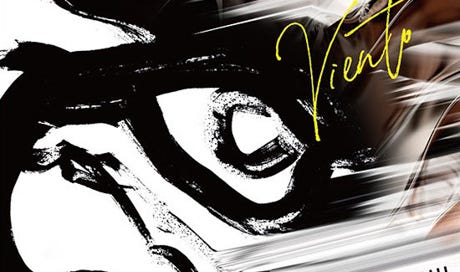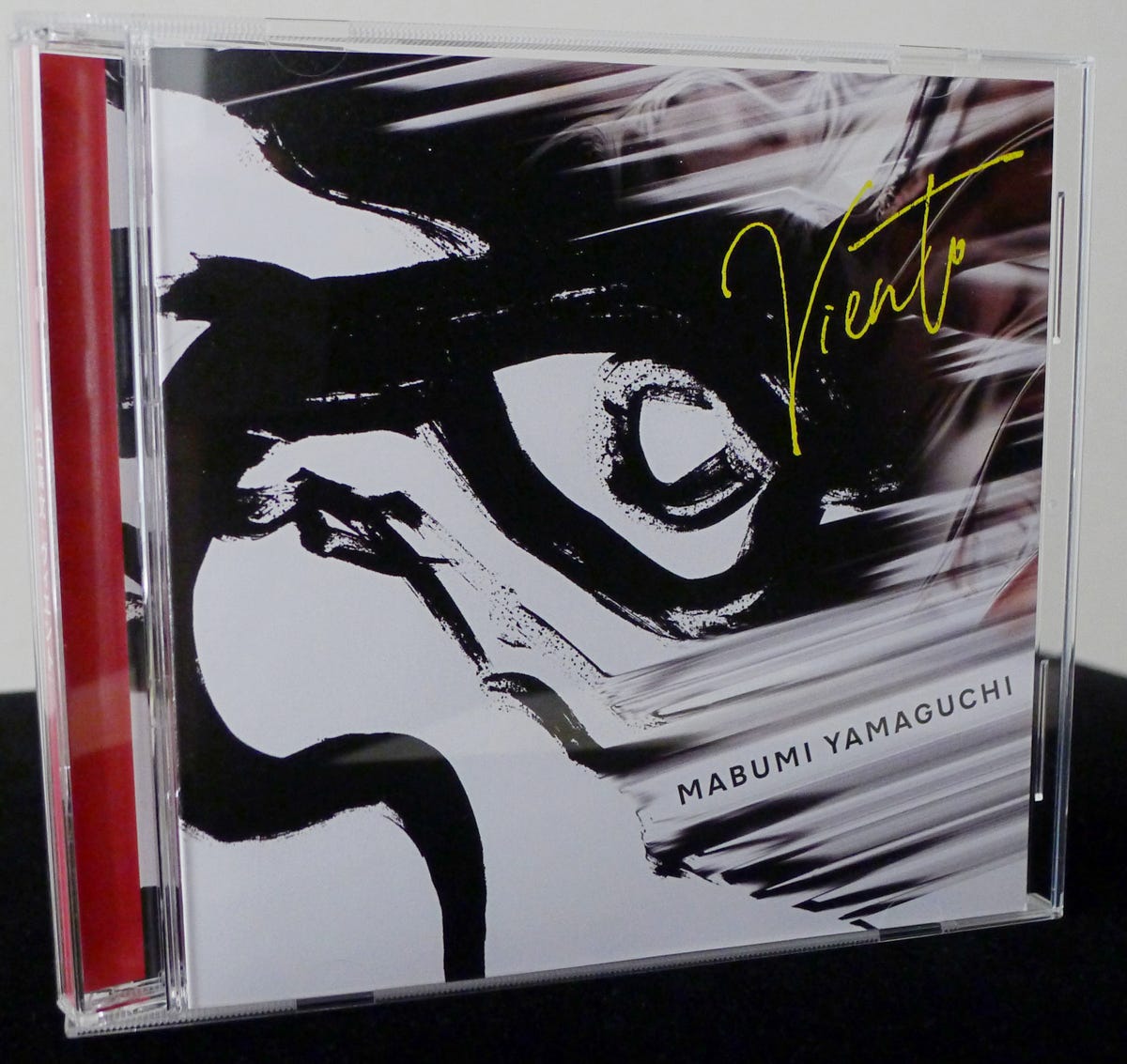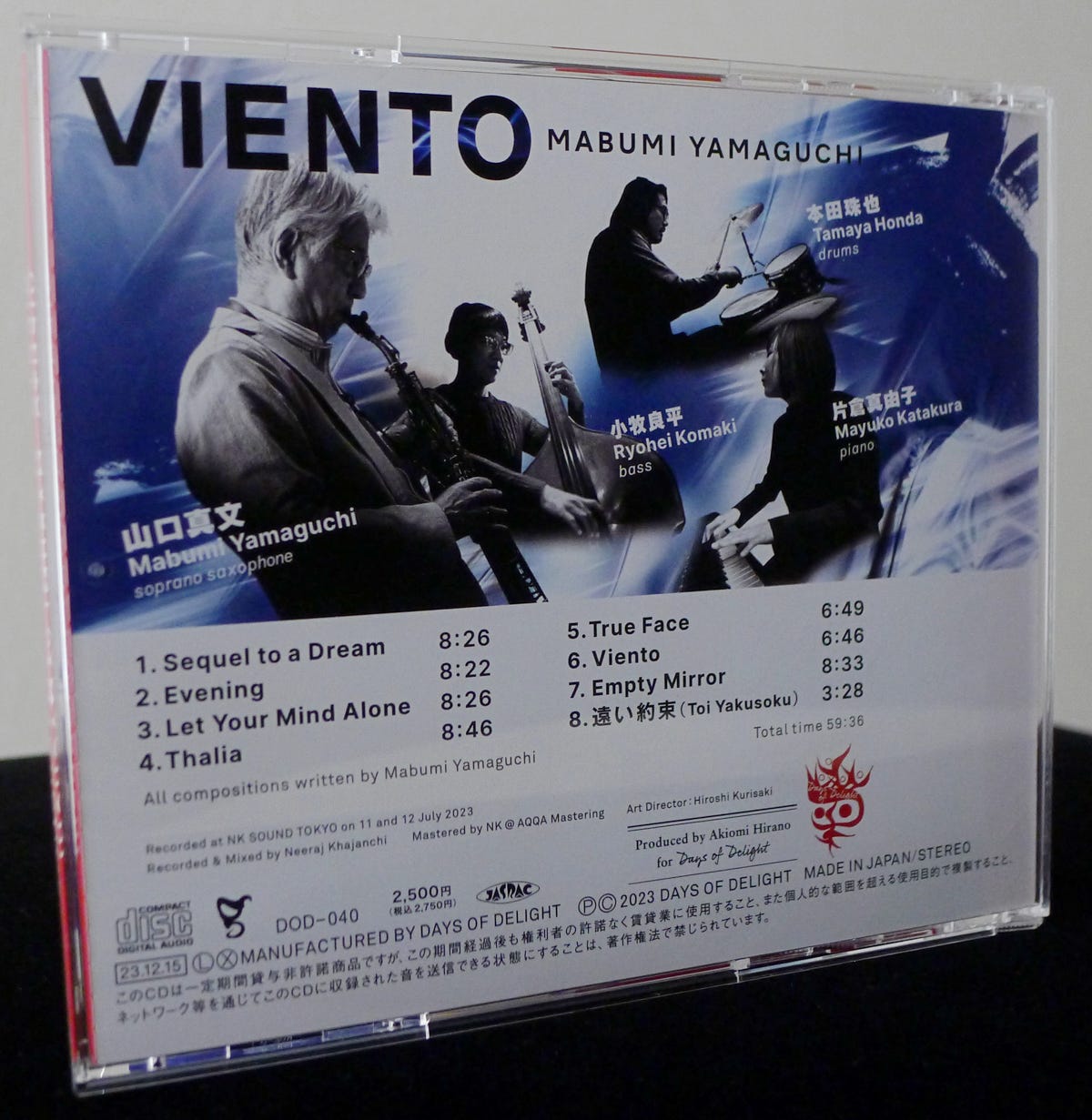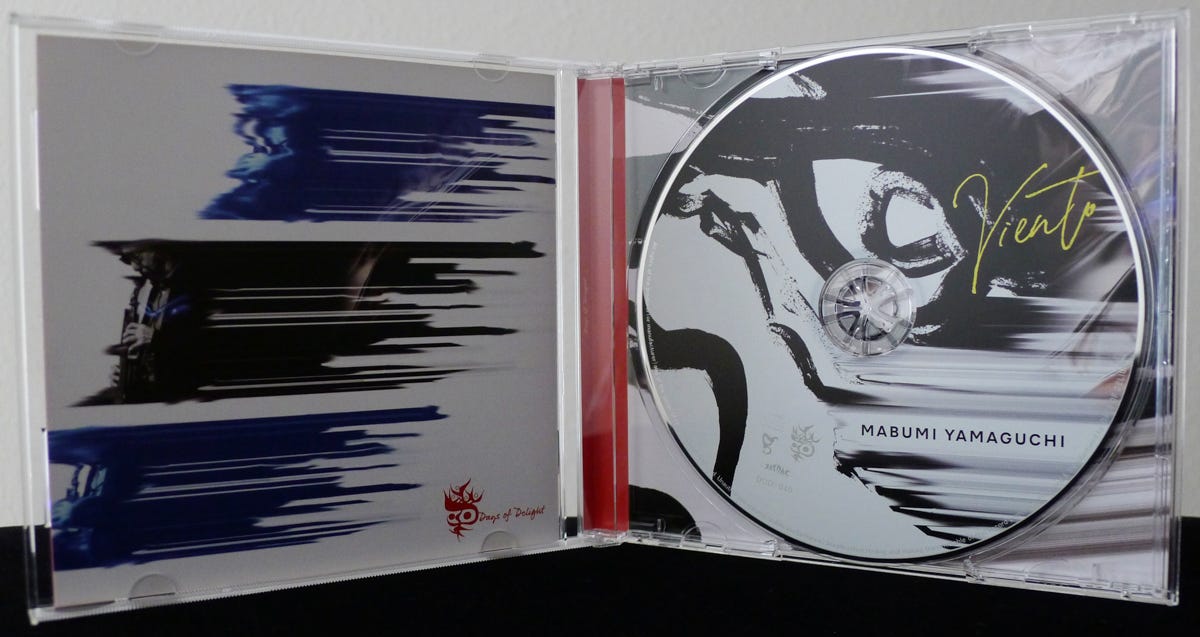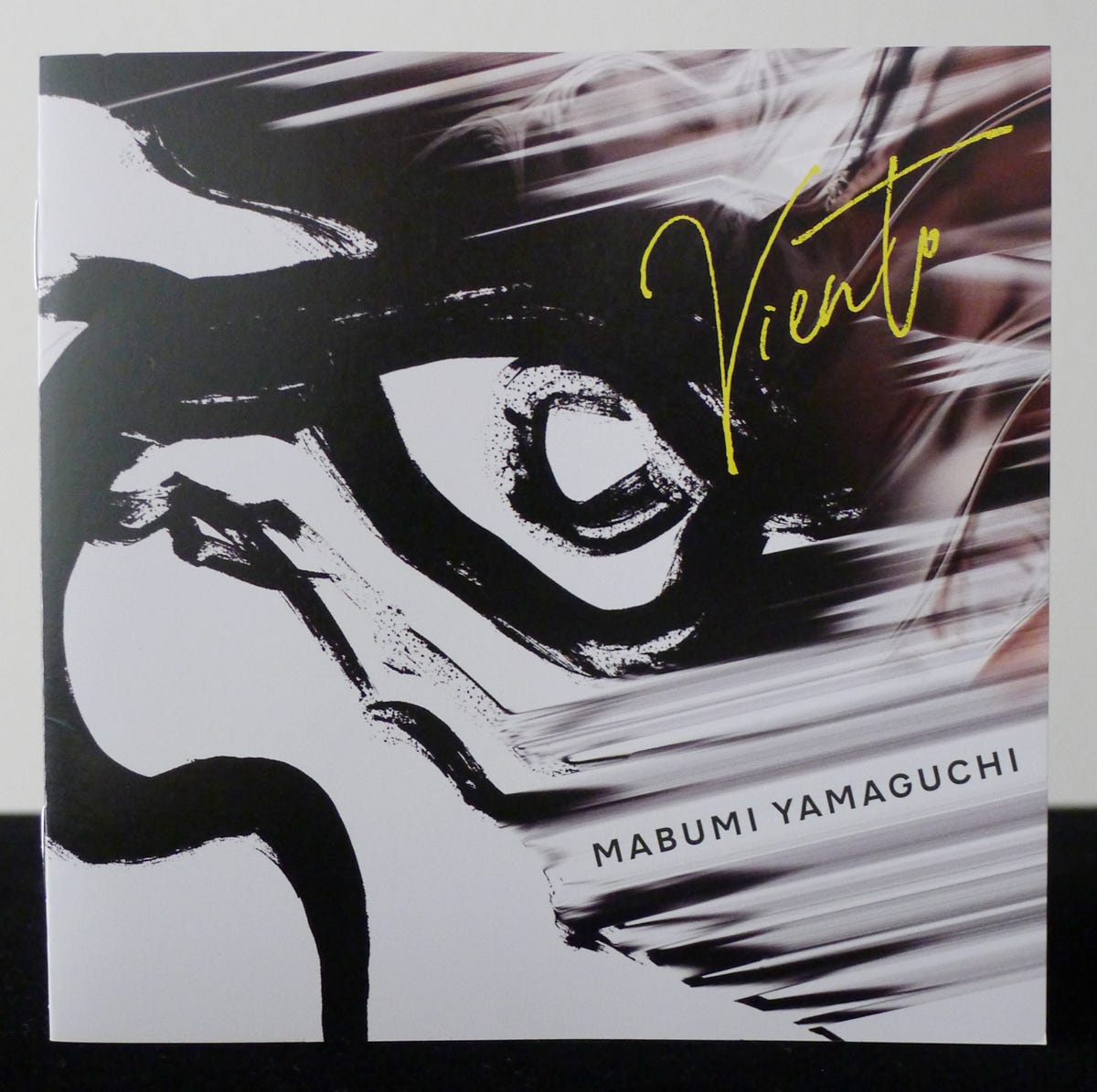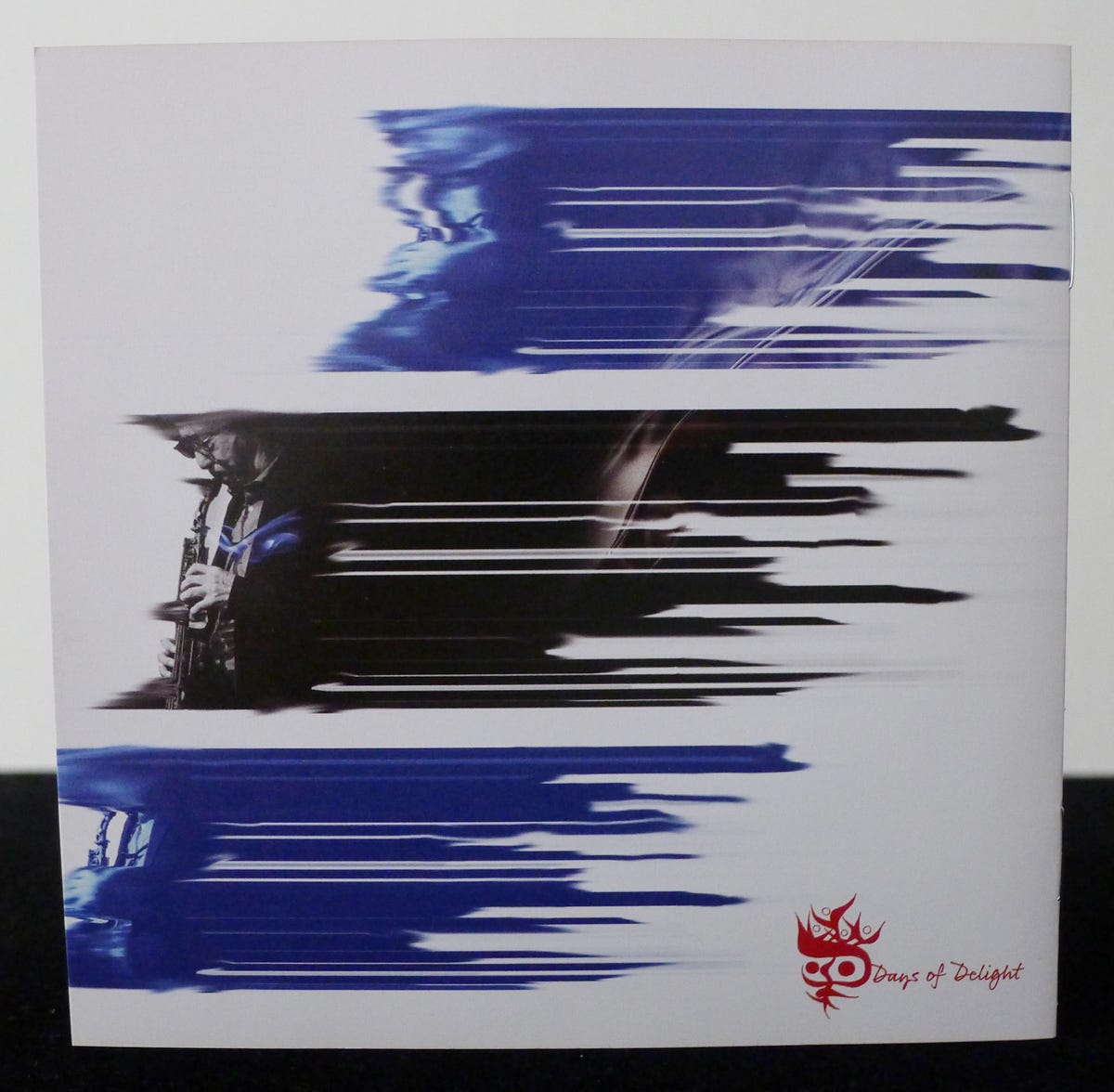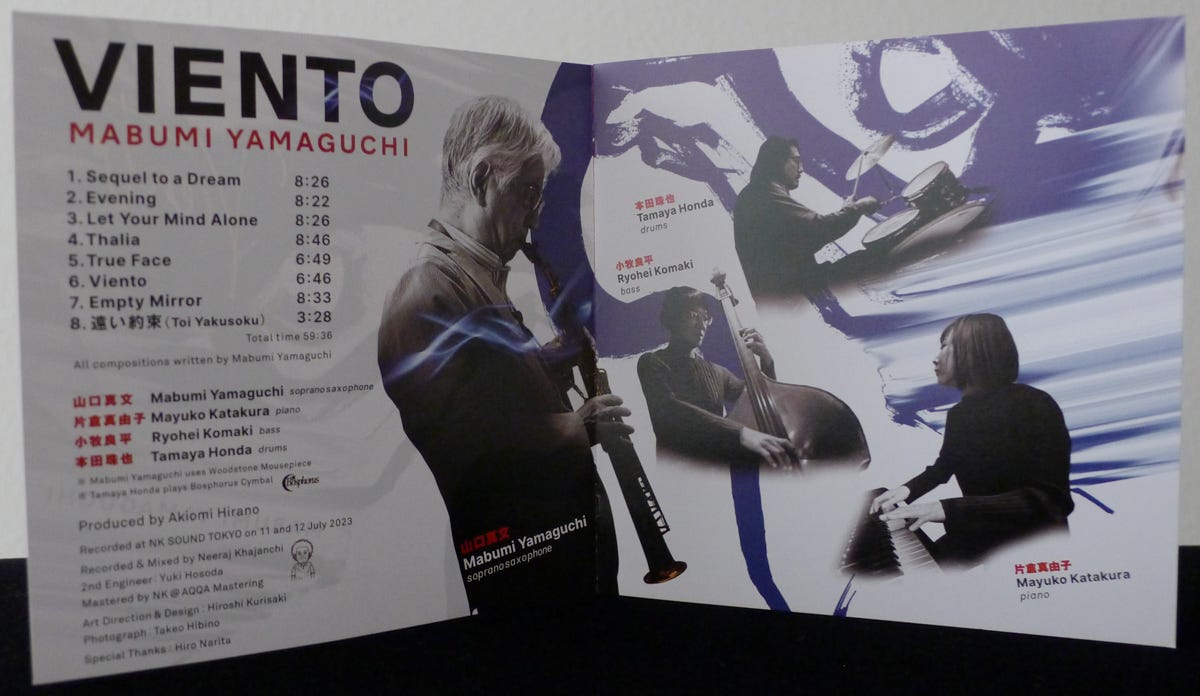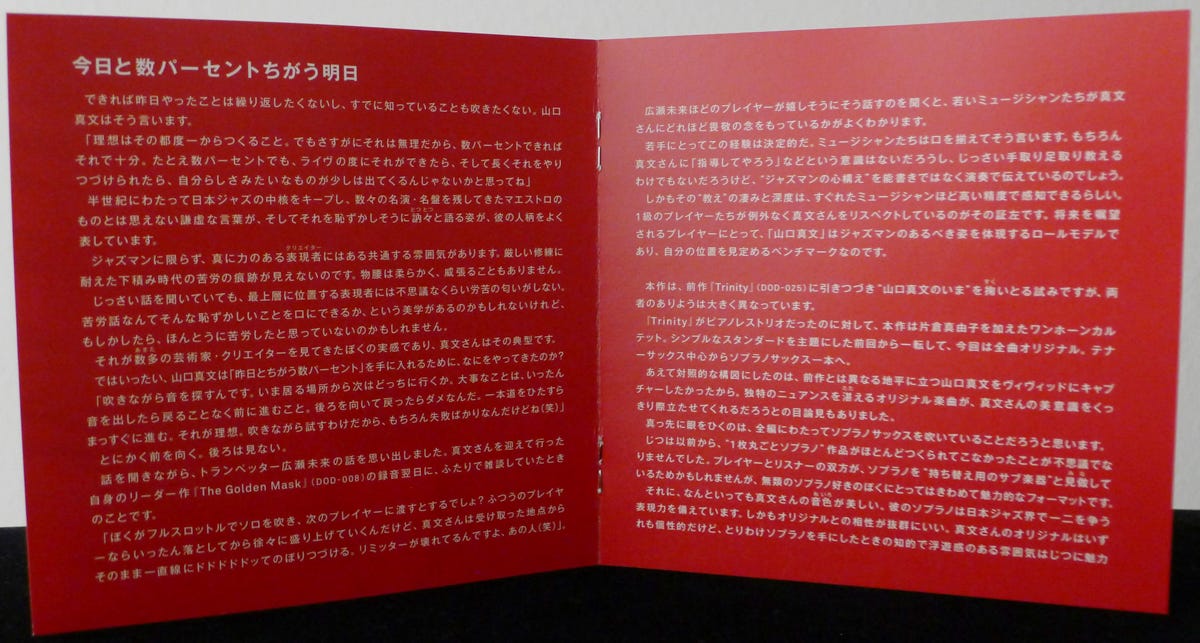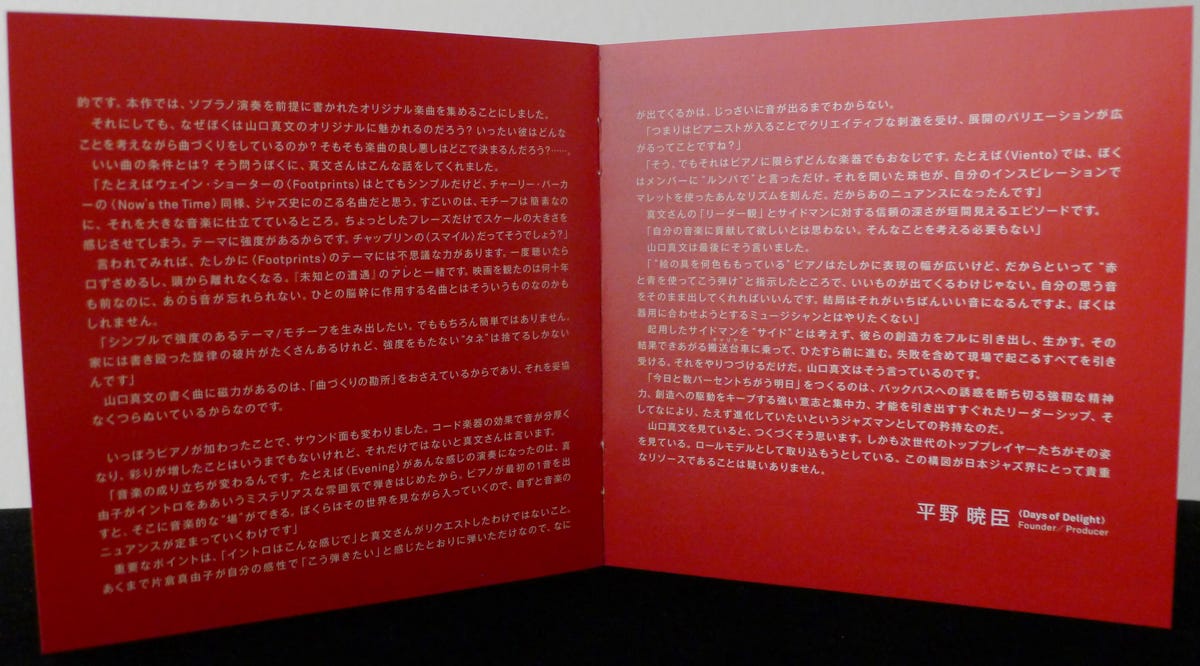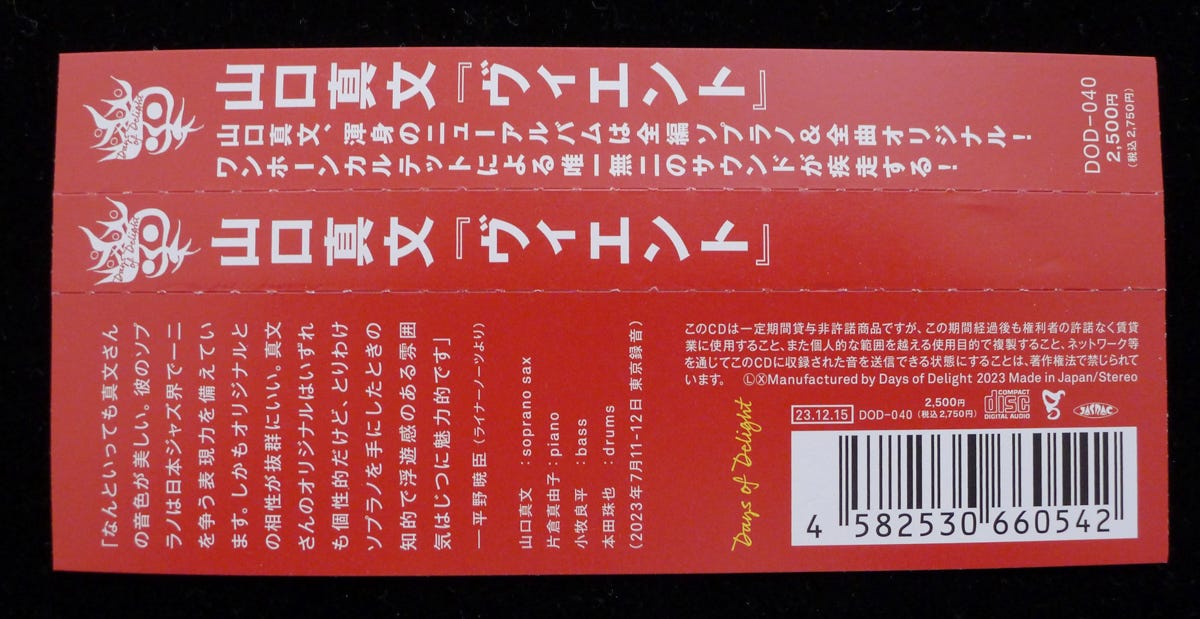Mabumi Yamaguchi: Viento
Like Mamoru Ishida’s Afterglow introduced previously, Mabumi Yamaguchi’s Viento is a 2023 jazz release from the Japanese jazz label Days of Delight which is doing a wonderful job of delivering the sound of authentic modern-day Japanese jazz in impeccably produced and attractive packages.
Viento is saxophonist Mabumi Yamaguchi’s second release on Days of Delight following his chord-less trio recording Trinity (2022), but he’s been playing and releasing albums for over five decades. In that time, he’s worked with stellar domestic and international musicians including drummers Motohiko Hino (“best jazz drummer in Japan” award winner throughout the 1970s) and George Otsuka for a landmark 1978 tour with Kenny Kirkland (piano), John Scofield (guitar), and Miroslav Vitous (bass). His recording Mabumi (1981) also featured Kirkland and Vitous with Tony Williams (drums) joining the lineup.
Yamaguchi’s live jazz activities started in the 60s and 70s at the venerable Tokyo jazz clubs Naru and Pit Inn. It’s remarkable that after nearly fifty years, Mabumi still consistently appears for fan-favorite and fulfilling jazz sessions at Naru (stay tuned for an upcoming spotlight on that beloved jazz haven, coming soon).
His new album Viento is a collection of eight of Yamaguchi’s originals, all written with the concept of using soprano saxophone in the forefront. This characteristic makes a strong impression as Yamaguchi’s bright tones extend like tendrils of vines embedded in cracks and grooves, skillfully navigating dramatic paths and always pushing forward through songs covering straight-ahead and modern jazz terrain.
This musical landscape shifts back and forth from dark, mellow, and mysterious (#1 “Sequel to a Dream”, #2 “Evening”), to fantastical and churning (#4 “Thalia”, #6 “Viento”), and to exciting and positive (#3 “Let Your Mind Alone”, #5 “True Face”, #7 “Empty Mirror”) when the uplifting mood is heightened as the good-feeling swing or cool funk sets in. The last track, the sweetly elegant song #8 “Toi Yakusoku” (Distant Promise), closes the album perfectly with Yamaguchi and pianist Katakura playing as a duo in a sentimental rubato with a Strayhorn/Ellington-ish emotional impact.
Liner Notes
(Translated from excerpts of Akiomi Hirano’s original Japanese liner notes)
Tomorrow a small percent different from today
If possible I don’t want to repeat what I did yesterday, I don’t want to play what I already know. So says Mabumi Yamaguchi.
“The ideal is to create from scratch each time. Of course, that’s impossible, so if I can do it just a few percent, that’s good. Even if it’s just a few percent, if I do that every time I play live and keep it going over a long time, a little bit of my personality will emerge, don’t you think?”
These humble words represent his character well. Spoken shyly and haltingly, it is hard to believe they come from a maestro who has maintained a presence at the core of Japanese jazz for half a century through many famous performances and recordings.
There is a certain quality common to truly compelling artists and creators, not just with jazz musicians. You may not see the signs of the hardships they endured through the accumulated years of severe training. Their demeanor is gentle and not arrogant.
Even when you hear their actual story, it’s rare to sense the strange hardships experienced by performers in the upper levels of their field. Perhaps there’s an aesthetic that makes it embarrassing to express difficulties through words, or maybe they don’t really think that they have suffered through hardships.
I’ve seen this in many artists and creators, and in my experience, Mabumi is of that type.
So, how on earth did Mabumi acquire the skill of making “Tomorrow a small percent different from today”?
“While playing I search for the sound. From where you are now, where do you go next? The vital point is when putting out a sound, don’t go back, move forward. You can’t turn around and go back. Concentrate on moving straight ahead down one path. That’s the ideal. While playing I’m trying things out, so of course there are plenty of mistakes, haha.”
For now, look forward. Don’t look back.
…
The first thing that strikes me from the outset is that soprano saxophone is played through the entire album.
Actually, for a long time now I’ve found it strange that there are so few albums with an “all-soprano” format. This may be due to some players and listeners who regard the soprano sax as a substitute instrument brought in for a change. But to someone like me who is an avid soprano sax fan, it’s an extremely appealing format.
Furthermore, Mabumi’s tone is undeniably beautiful. His soprano has an expressive power that ranks among the best in the world of Japanese jazz. It is perfectly matched to his original compositions, as well. Mabumi’s originals all possess his distinctive personality, but when played with soprano, they take on an intelligent and floating quality that is especially fascinating. For this album, we decided to collect original songs which were written to be performed on soprano sax.
Regardless, why I am so attracted to Mabumi Yamaguchi’s original compositions? What does he think about when he is writing a song? What makes a song have good or bad qualities in the first place…?
What are the conditions for a good song? When I asked about this, this is what Mabumi said to me.
“For example, Wayne Shorter’s ‘Footprints’ is very simple, but just like Charlie Parker’s ‘Now’s the Time’, it is a masterpiece ingrained in jazz history. The amazing thing is that even though the motif is simple, it is fashioned into a large piece of music. With just a few phrases you can feel the size of it. It’s because there is strength in the theme. It’s the same with Charlie Chaplin’s ‘Smile’, right?”
Now that I think about it, the theme of “Footprints” certainly does have a mysterious power. It’s hummable, and it stays in your head. It’s the same as the one from Close Encounters of the Third Kind. Even though it’s been decades since I’ve seen the movie, those five notes are unforgettable. Maybe a masterpiece is something that affects a person’s brainstem like this.
“I want to create themes or motifs that are simple and strong. Of course, it’s not easy. There are many fragments of tunes that I’ve scribbled down at home, but if the seeds don’t have that strength, I have to toss them out.”
The magnetism of Mabumi Yamaguchi’s songwriting is that he grasps the “vital point of songwriting”, and he is steadfast in following through without compromise.
…
Making “tomorrow a small percent different from today” requires a tough spirit to resist the temptation to pass the ball back, a strong will and concentration to maintain the drive to create, excellent leadership to draw out talent, and above all, the integrity of a jazz musician who wants to constantly evolve.
When I see Mabumi Yamaguchi, I feel this keenly. And the next generation of top players are watching this figure. They are taking him in as a role model. There’s no doubt that this structure is a valuable resource for the world of Japanese jazz.
Akiomi Hirano (Days of Delight)
Founder/Producer
Viento by Mabumi Yamaguchi
Mabumi Yamaguchi - soprano saxophone
Mayuko Katakura - piano
Ryohei Komaki - bass
Tamaya Honda - drums
Released in 2023 on Days of Delight as DOD-040
Japanese names: Mabumi Yamaguchi 山口真文 (Yamaguchi Mabumi) Mayuko Katakura 片倉真由子 (Katakura Mayuko) Ryohei Komaki 小牧良平 (Komaki Ryohei) Tamaya Honda 本田珠也 (Honda Tamaya)
Related Albums
Yuichiro Aratake: The Light Flows In (2005)
Mayuko Katakura: Inspiration (2009)
Mayuko Katakura: Faith (2010)
Les Komatis: Les Komatis (2015)
Mayuko Katakura: The Echoes of Three (2015)
Junichiro Ohkuchi Trio: Invisible (2016)
Mabumi Yamaguchi: Let Your Mind Alone (2017)
Nanami Haruta: II (2022)
Naoko Tanaka: Appreciation (2022)
Mamoru Ishida: Afterglow (2023)
Other Links
Audio and Video
Excerpt from “True Face”, track #5 on this album:

